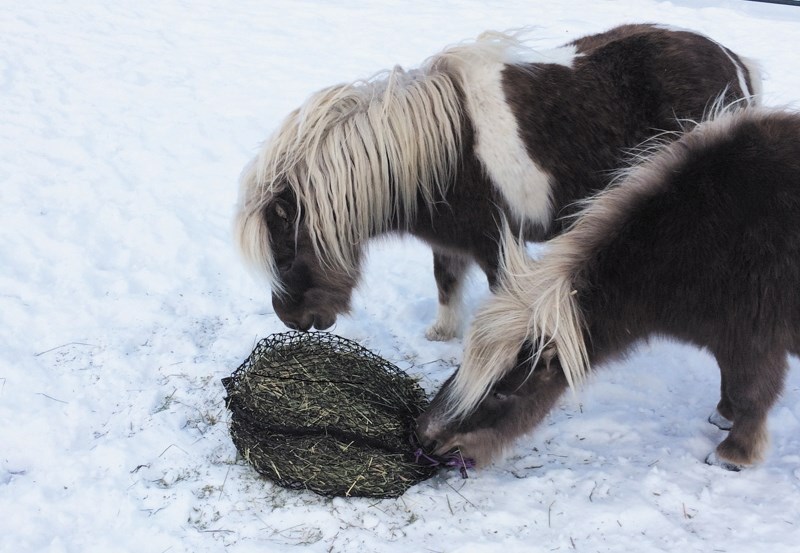One challenge that some of you horse owners might face in winter care for your horses is how to manage those “easy keepers” who seem to put weight on just by breathing! I have several of those (all my minis and one rather “robust” Canadian gelding) and keeping their weight to a healthy level in the winter is a challenge.
A healthy horse requires a source of clean water, nutritional feed, protection from extreme elements, companionship and exercise. For the horses living outdoors, it can be tricky to balance the nutritional needs with the proper weight.
In other seasons, the horses are getting enough exercise so achieving the proper balance is generally not a problem but when we feed extra roughage in the winter to help them maintain their body temperature, those “easy keepers” become little “fat factories”! Obesity in horses can lead to a host of other problems so it needs to be addressed and prevented.
One solution I use for my miniature horses is to slow down their consumption of hay by using slow feeder nets. I put one serving in each net, secure the closure on the nets so the horses can’t get their feet caught and throw the nets into their small field. They each have their own net but they still have to shuffle about and check out all the nets as the other nets are always better! They flip the nets, drag them around, nibble at the bits that fall out and generally get lots of activity. It is a great game to pick up a net and trot off with another mini in pursuit – great exercise!
I have seen some folks who confine their easy keepers into a small area with no forage and only give the horses small amounts of feed once or twice a day – this is not a good solution for a number of reasons. Horses do not thrive if isolated from other horses, often develop bad habits out of sheer boredom (wood chewing, weaving, pawing) and can develop intestinal problems (ulcers) from the stress and lack of food moving through their guts.
Another successful method a friend of mine employs is to provide free choice supply of a nutritionally deficient roughage – e.g. straw, which allows the horses to nibble to their hearts content without the nasty side effect of weight gain. A slow feeder net around this food source will also aid in slowing down consumption and keep the horses occupied for a longer period of time.
I did discover one downside of my equine management program. My field for the miniature horses shares two fences with the pasture for my full size horses. The miniatures have the hay nets while the “big boys” get hay twice a day and forage the rest of the time in their big field so they are getting their exercise.
While gathering the empty slow feeder nets from the minis this morning, I discovered I was missing one. I looked everywhere – all the pens that feed in to the mini pasture, everywhere in the mini pasture – no net! We did not have fresh snowfall over night so it was not like the net could be buried – where was it? I looked over at the two “innocent” big horses standing quietly watching my explorations and decided to expand my search into the big horse pasture. What do I find but the missing hay net (empty) about thirty feet into the pasture – aha! One of the minis must have pushed the net to within big horse nose distance under the bottom board and the net was confiscated by a large horse!
Best of the season to all my readers! Hug a horse for Christmas!




